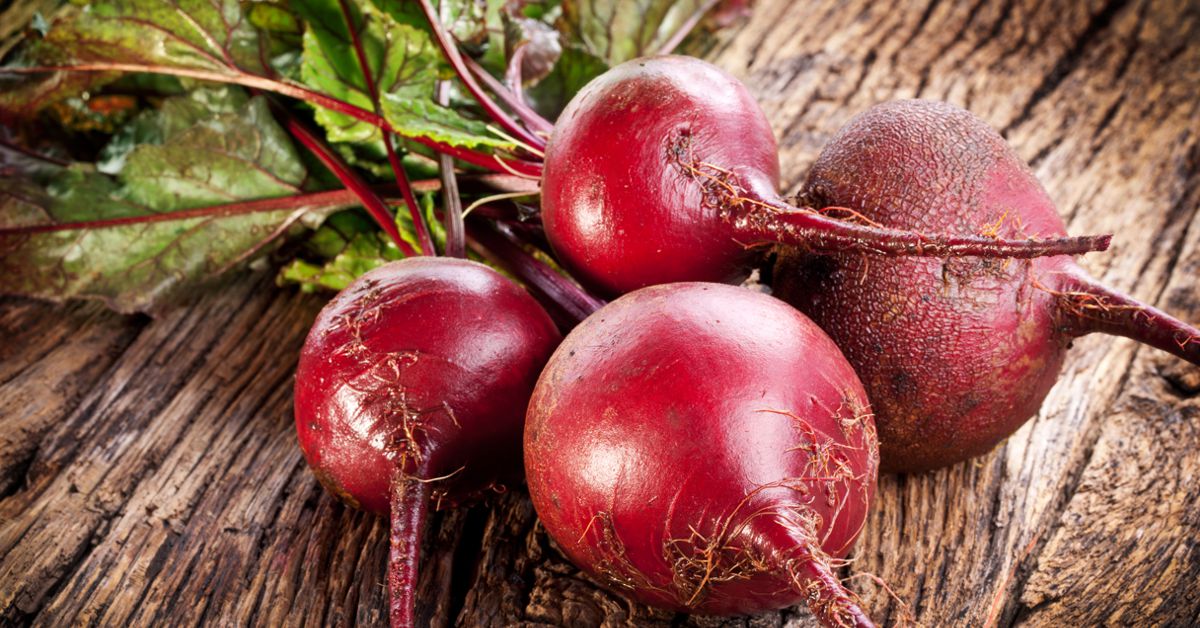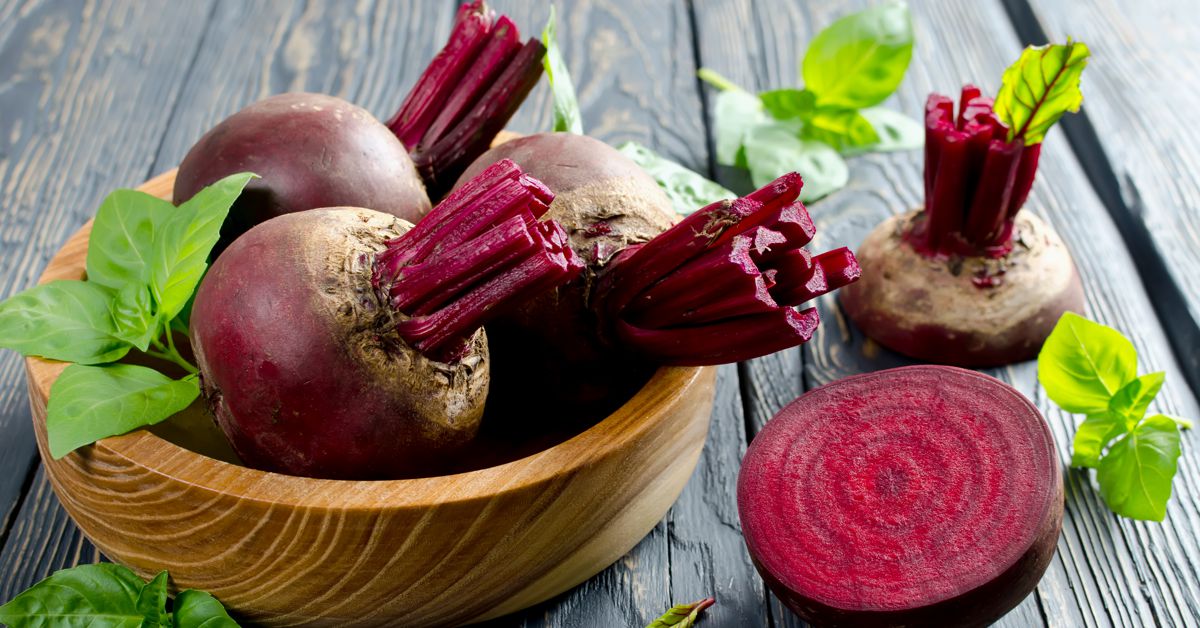Beetroot, also known as beet, is a type of root vegetable that is often deep red or purple in color.
It is a staple in many cuisines around the world, and has a sweet, earthy flavor.
It is highly nutritious, containing a range of vitamins, minerals, and other beneficial plant compounds.
In this article, we will delve into the nutritional value of this vegetable and the various health benefits that it offers.
Nutritional value of beetroot
This vegetable is an excellent source of several important nutrients. One serving of it (about 100 grams) contains the following:
- 47 calories
- 10 grams of carbohydrates
- 2 grams of protein
- 0.2 grams of fat
- 2 grams of fiber
It is also a good source of several essential vitamins and minerals, including:
- Folate (vitamin B9): Important for proper brain function and the production of red blood cells.
- Potassium: Helps to regulate heart function and fluid balance in the body.
- Manganese: Helps with the metabolism of carbohydrates and the formation of healthy bones.
- Iron: Helps to carry oxygen to the body's cells.
- Vitamin C: Helps to boost the immune system and promote the production of collagen.
In addition to these nutrients, it also contains a number of plant compounds that have been shown to have health-promoting effects.
These include betalains, which give this vegetable its distinctive color and have antioxidant and anti-inflammatory properties, as well as nitrates, which have been shown to improve athletic performance and lower blood pressure.
Health benefits of beetroot
The unique combination of nutrients and plant compounds in it contribute to a number of health benefits. Here are some of the key ways that this vegetable can improve your health:
- Lowering blood pressure: The nitrates in beetroot have been shown to relax and dilate blood vessels, which can help to lower blood pressure. In fact, several studies have found that consuming beetroot or beetroot juice can significantly reduce blood pressure in people with high blood pressure.
- Improving athletic performance: Nitrates have also been shown to improve athletic performance by increasing the efficiency of mitochondria, the powerhouses of cells. This can help to increase endurance and reduce fatigue during exercise.
- Supporting brain health: The high levels of folate in beetroot make it a great food for supporting brain health. Folate is essential for the production of neurotransmitters, which are chemicals that help to transmit signals in the brain. Low levels of folate have been linked to an increased risk of cognitive decline and dementia.
- Detoxifying the body: Beetroot is a natural detoxifier, thanks to its high levels of antioxidants and plant compounds. These substances help to protect cells from damage caused by free radicals, which can contribute to the development of chronic diseases.
- Boosting the immune system: The high levels of vitamin C in beetroot can help to boost the immune system and protect against infection. Vitamin C is also important for the production of collagen, which helps to keep skin looking healthy and youthful.
- Supporting gut health: The fiber in beetroot can help to promote healthy digestion and prevent constipation. Beetroot also contains prebiotics, which are non-digestible plant fibers that feed the beneficial bacteria in the gut and support the growth of a healthy microbiome.
Breakfast
- Ricotta Breakfast Toast: Spread ricotta cheese on top of toasted bread and top with sliced beetroot and a sprinkle of chopped walnuts.
- Egg Breakfast Wrap: Dice up some cooked beetroot and mix with scrambled eggs. Wrap the mixture in a tortilla for a quick and easy breakfast on the go.
- Quinoa Breakfast Bowl: Cook quinoa according to package instructions and top with diced beetroot, sliced avocado, and a sprinkle of hemp seeds.
- Oat Breakfast Smoothie: Blend together cooked beetroot, rolled oats, milk, and your choice of fruit for a nourishing breakfast smoothie.
- Banana Breakfast Muffins: Mix together mashed bananas, grated beetroot, and whole wheat flour to make a batch of healthy breakfast muffins.

Lunch
- Feta Salad: Toss together mixed greens, sliced parts of this vegetable, crumbled feta cheese, and a homemade vinaigrette dressing.
- Hummus Wrap: Spread hummus on a wrap and top with sliced beetroot, lettuce, and sliced avocado for a tasty and satisfying lunch.
- Goat Cheese Quiche: Mix together cooked beetroot, crumbled goat cheese, and beaten eggs and bake in a pie crust for a flavorful quiche.
- Chickpea Burgers: Mix together cooked beetroot, chickpeas, and breadcrumbs to form patties and cook on the grill or in a pan for a hearty vegetarian burger.
- Turkey Salad: Combine diced cooked beetroot with sliced turkey, mixed greens, and a homemade vinaigrette for a protein-packed lunch.
Dinner
- Salmon Salad: Toss together mixed greens, sliced beetroot, and a grilled salmon fillet for a healthy and satisfying dinner.
- Beef Stir-Fry: Dice up some cooked beetroot and stir-fry with diced beef, vegetables, and your choice of seasonings for a quick and flavorful dinner.
- Mushroom Risotto: Add diced cooked beetroot to a classic risotto recipe for a unique twist on the classic dish.
- Lentil Soup: Blend together cooked beetroot, lentils, and vegetables for a nourishing and hearty soup.
- Chickpea Curry: Cook diced beetroot with chickpeas, spices, and coconut milk for a flavorful and vegetarian-friendly curry.
Conclusion
In conclusion, beetroot is a nutritious and versatile root vegetable that offers a range of health benefits.
It is a good source of key nutrients like folate, potassium, manganese, iron, and vitamin C, and contains plant compounds like betalains and nitrates that have been shown to have health-promoting effects.
Beetroot has been shown to lower blood pressure, improve athletic performance, support brain health, detoxify the body, boost the immune system, and support gut health.
Incorporating it into your diet is easy, and there are many delicious and creative ways to do so.
Thank you for reading our article and trying out the delicious recipes!
If you enjoyed the recipes and found them helpful, we encourage you to bookmark our site and check back for more tasty and healthy meal ideas.
We are always updating our content with new and interesting ideas for meals and snacks, so there is always something new to discover for your nutrition.

Leave A Comment